Criminal justice research methods
Langue : Anglais
Auteurs : NEUMAN W., WIEGAND Bruce

Up-to-date and comprehensive, this book offers a thorough discussion of qualitative and quantitative research methods in criminal justice. The authors discuss the underlying logic of each approach as well as how to collect and analyze data for each, showing readers the larger context in which criminal justice science is done. The interdependence between theory and method is emphasized throughout, along with the importance of making alternative philosophical assumptions when doing research. Readers gain a solid foundation to use as they continue their study of methodology or conduct research techniques in applied settings. KEY TOPICS: The book covers all eight major methodological topics, with an emphasis on qualitative research methods, global perspective, and comparative/critical perspective. In addition it includes a unique treatment of white-collar crime, extensive coverage of ethical and political issues, and a section on how to find and read articles and write a literature review. For anyone interested in the research methods of criminal justice.
Each chapter begins with Introduction and concludes with Conclusion, Key Terms, Review Questions, Notes, and Recommended Readings. Part 1: CRIMINOLOGICAL RESEARCH AND METHODOLOGY.. 1.Science and Research. Alternatives to Criminological Research. How Science Works. Steps of the Research Process. Qualitative and Quantitative Research. Why Conduct Research? 2.Dimensions of Research. Dimensions of Research. Data Collection Techniques Used. 3.Theory and Research. What Is Theory? Social Theory versus Ideology. The Parts of Theory. Fact versus Theory. Theories. Theory and Research: The Dynamic Duo. 4.Questions of Methodology. The Three Approaches. Positivist Criminology. Interpretive Criminology. Critical Criminology. Expanding Critical/Comparative Criminology: Feminist and Postmodern Approaches. 5.Reading Other Peoples Research. Reasons to Conduct a Literature Review. Where to Find the Research Literature. How to Conduct a Systematic Review. What a Good Review Looks Like Once It Is Written. Part 2: RESEARCH USING QUANTITATIVE DATA.. 6.Quantitative Research Designs. Learning the Language of Variables and Hypotheses. Selecting and Refining Research Topics. Example Studies. 7.Quantitative Criminological Measurement. Why Measure? Measurement and Research Design. Reliability and Validity. Relationship between Reliability and Validity. Levels of Measurement. Introduction to Measurement Theory. The Principle of Heterogeneous Observation. Specialized Measures: Scales and Indexes. Index Construction. Scales. Special Indicators. Specialized Techniques for Index and Scale Construction. 8.Experimental Research. Random Assignment. Experimental Design Logic. Internal and External Validity. Practical Considerations. Results of Experimental Research: Making Comparisons. A Word on Ethics. 9.Sampling. Types of Sampling. How Large Should a Sample Be? Drawing Inferences. 10.Survey Research. The Logic of Survey Research. Constructing the Questionnaire. Types of Surveys: Advantages and Disadvantages. Interviewing. The Ethical Survey. 11.Nonreactive Research and Available Data. Nonreactive Measurement. Content Analysis. Existing Statistics/Documents and Secondary Analysis. Issues of Inference and Theory Testing. 12.Analyzing Quantitative Data. Dealing with Data. Results with One Variable. Results with Two Variables. More Than Two Variables. Inferential Statistics. Part 3: RESEARCH USING QUALITATIVE DATA.. 13.Qualitative Research Design. The Qualitative Orientation. Characteristics of Qualitative Research. Complementary Evidence. Example Studies. 14.Field Research. The Logic of Field Research. Choosing a Site and Gaining Access. Relations in the Field. Observing and Collecting Data. The Field Research Interview. Leaving the Field. Ethical Dilemmas of Field Research. 15.Historical-Comparative Research. The Logic of Historical-Comparative Research. Steps in a Historical-Comparative Research Project. Data and Evidence in Historical Context. Comparative Research. Equivalence in Historical-Comparative Research. Ethics. 16.Analyzing Qualitative Data. Quantitative and Qualitative Analysis. Concept Formation. Methods of Qualitative Data Analysis. What Is Missing, or the Importance of Negative Evidence. Diagrams and Other Tools. Part 4: FINAL CONSIDERATIONS.. 17.Ethical and Political Issues in Criminological Research. Ethical Concerns and the Individual Researcher. Ethical Issues Involving Research Subjects. Ethics and the Scientific Community. Ethics and the Sponsors of Research. Ethics of the Larger Society or Government. The Dissemination and Use of Research Findings. Objectivity and Value Freedom. APPENDICES. Appendix A: A Table of Randomly Selected Five-Digit Numbers. Appendix B: The Research Report and Proposals. The Writing Process. The Quantitative Research Report. The Qualitative Research Report. The Research Proposal. Appendix C: Computers in Criminological Research. How Computers Help the Social Researcher. Bibliography. Name Index. Subject Index.
Date de parution : 02-2000
Ouvrage de 515 p.
© 2024 LAVOISIER S.A.S.
